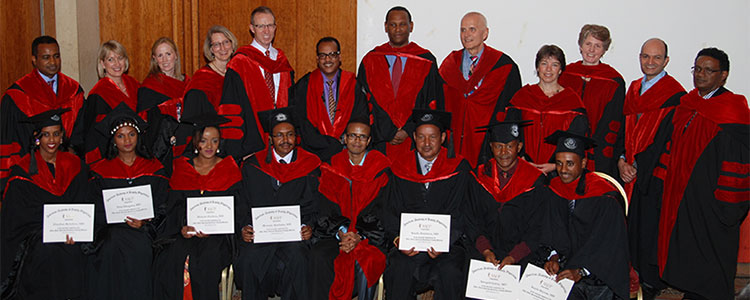
Seven doctors graduated from Ethiopia’s first family medicine residency program on February 4, 2016, in Addis Ababa, Ethiopia. Graduates holding diplomas in the first row include, left to right, Elnathan Kebebew, Sena Dhugasa, Meseret Zerihun, Murutse Atsebaha, Assefa Alamirew, Assegid Geleta, and Assefa Beyene.
On February 4, 2016, seven Ethiopian doctors became the first graduates from the family medicine residency program at Addis Ababa University’s College of Health Sciences. This 3-year residency program is the first such program in Ethiopia and an important step in improving health care services in a country with more than 100 million people. The residency program is one outcome of the University of Wisconsin’s Medical Education Partnership Initiative (MEPI) with Addis Ababa University.
“These graduates are an inspiration to me, as they create Family Medicine in Ethiopia from the ground up to suit the Ethiopian context and needs,” says UW family physician Ann Evensen, MD, who attended the graduation ceremony in Ethiopia. “It was an honor to represent the UW and the American Academy of Family Physicians at such an historic occasion.”
In 2010, the NIH funded the Medical Education Partnership Initiative with a $130 million grant, aimed at enhancing medicine in 12 sub-Saharan African countries. These efforts were spearheaded by Girma Tefera, MD, a vascular surgeon in the UW Department of Surgery and a native of Ethiopia, and Cynthia Haq, MD, from the UW Department of Family Medicine and Community Health.
“When I first visited Ethiopia in 2001, very few people had heard about family medicine,” reflects Haq.
Through a series of visits and collaborations with faculty from AAU, the UW, and University of Toronto, the Ethiopian Ministry of Health approved the first training program in 2012. Government leaders have now embraced the concept and called for rapid expansion and development of new family medicine training programs.
“The ownership of this program is really in their hands, which helps ensure it will succeed and be sustainable,” Tefera says.
According to Haq, “The first graduates of the AAU family medicine residency are living examples of the value of well-trained generalist physicians who can provide high-quality care for patients across the life span and are prepared to promote the health of individuals, families and communities. We look forward to continued progress as our new colleagues expand and open new training programs.”
Published: February 2016
